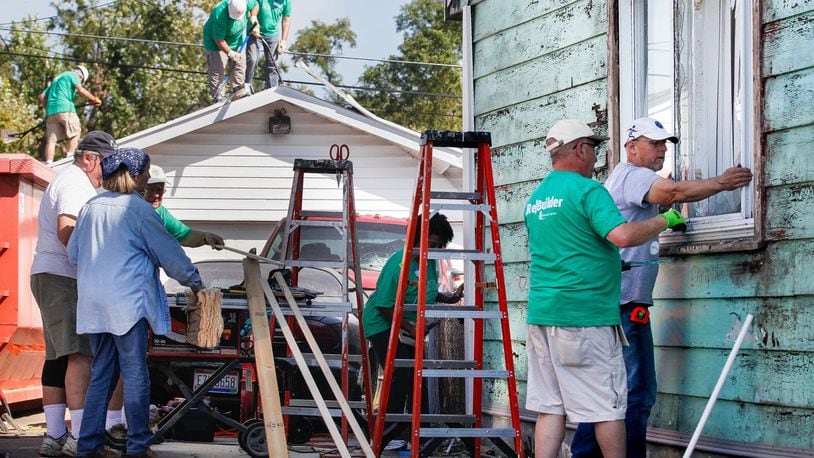Jessica Brady feared her house on Swallow Drive in Harrison Twp. would never get fixed, including her 7-year-old son’s bedroom that was destroyed by a falling tree. Her husband, Jimmy, died three years ago on Memorial Day, and she couldn’t afford homeowners insurance on her own, she said.
“I was paying Vectren, DP&L, buying groceries, and I didn’t expect a tornado to come,” she said. “I kind of let the insurance go.”
Brady went to FEMA and was approved for $3,000, “which didn’t even put a dent” in repairing the wall and the roof.
“I got a little bit discouraged that I wasn’t getting anywhere,” she said.
Brady’s fortune reversed Thursday as more than 20 volunteers from nearby Shiloh Church dug into repairs on her garage, exterior windows, siding — and put her son Jagger’s bedroom back together.
“I can’t even describe the excitement,” she said. “My son didn’t even want to go to school today. He just wanted to stay home and see his room fixed.”
Credit: Chris Stewart
Credit: Chris Stewart
The Long-Term Recovery Operations Group’s housing committee has been working on the “very complicated puzzle” of figuring out the process of getting uninsured homes repaired through a variety of grants, gifts, donations and volunteer labor, said Amy Radachi, president and CEO of Rebuilding Together Dayton. The work could take years to finish.
One piece of the puzzle fell into place last month with $5 million in funding from the Federal Home Loan Bank of Cincinnati’s Disaster Reconstruction Program. Brady is an early grant recipient.
Andy Howell, president and CEO of the Federal Home Loan Bank of Cincinnati, said the grants help keep communities intact following natural disasters.
MORE: Tornado assistance helpline now taking calls
“In many cases, we see when this happens that communities might fall apart, residents leave, they don’t rebuild, they don’t come back,” he said. “And we want to help maintain the integrity of the community and help it thrive and survive moving forward.”
Along with Rebuilding Together Dayton, the other groups forming the local housing recovery nucleus in Montgomery County include County Corp, Habitat for Humanity and Miami Valley Community Action Partnership.
Rebuilding Together Dayton organized the Shiloh Church volunteers who will work on Brady’s house through Saturday.
“There are a lot of unmet needs, and that’s where we come in,” said Michelle Hausman, a program director with Rebuilding Together Dayton. “For a lot of the homeowners affected by the tornadoes, they might not have homeowners’ insurance because it was deciding between that and medication or food.”
The path of the most destructive tornado, an EF4, went right through some of Montgomery County’s most vulnerable neighborhoods in Trotwood and in Harrison Twp., where 15 percent of all parcels were affected.
Credit: Chris Stewart
Credit: Chris Stewart
“Especially in areas that were hit, a lot of homeowners already had issues with their houses, and this has just added onto their worries,” Hausman said.
As many as 35 volunteers will be at Brady’s house today and nearly that many on Saturday, said Sue Cox, Shiloh Church member who is also on Rebuilding Together Dayton’s board.
Usually in the fall, church members travel to repair housing in Appalachia. But this year the mission trip will be only blocks away from the church on Philadelphia Drive at North Main Street.
“We are really happy to do something in our immediate neighborhood following the tornadoes,” Cox said.
Many survivors with insurance have already had homes repaired or started the process. Those in limbo without means to make repairs should call the 211 HelpLink number to connect with a case manager who can identify resources and help survivors achieve recovery goals, according to officials.
Brady said help will come to survivors, but it will take patience.
“Don’t give up. Just keep trying,” she said. “Somebody will help you.”
Assistance remains available
Survivors who need additional aid or can call a disaster recovery helpline.
The United Way’s 211 HelpLink number will connect survivors to special operators who can complete an assessment and offer one-on-one case management assistance. The operators are available weekdays from 8 a.m. to 8 p.m.
The service is available for all Miami Valley households impacted by the tornadoes. If 211 service is not available in your area, survivors may call 937-225-3000.
Volunteer opportunities
The Miami Valley Long-term Recovery Operations Group’s website, MVStrong.org, provides multiple ways for individuals and groups to identify volunteer opportunities to support tornado survivors.
About the Author
